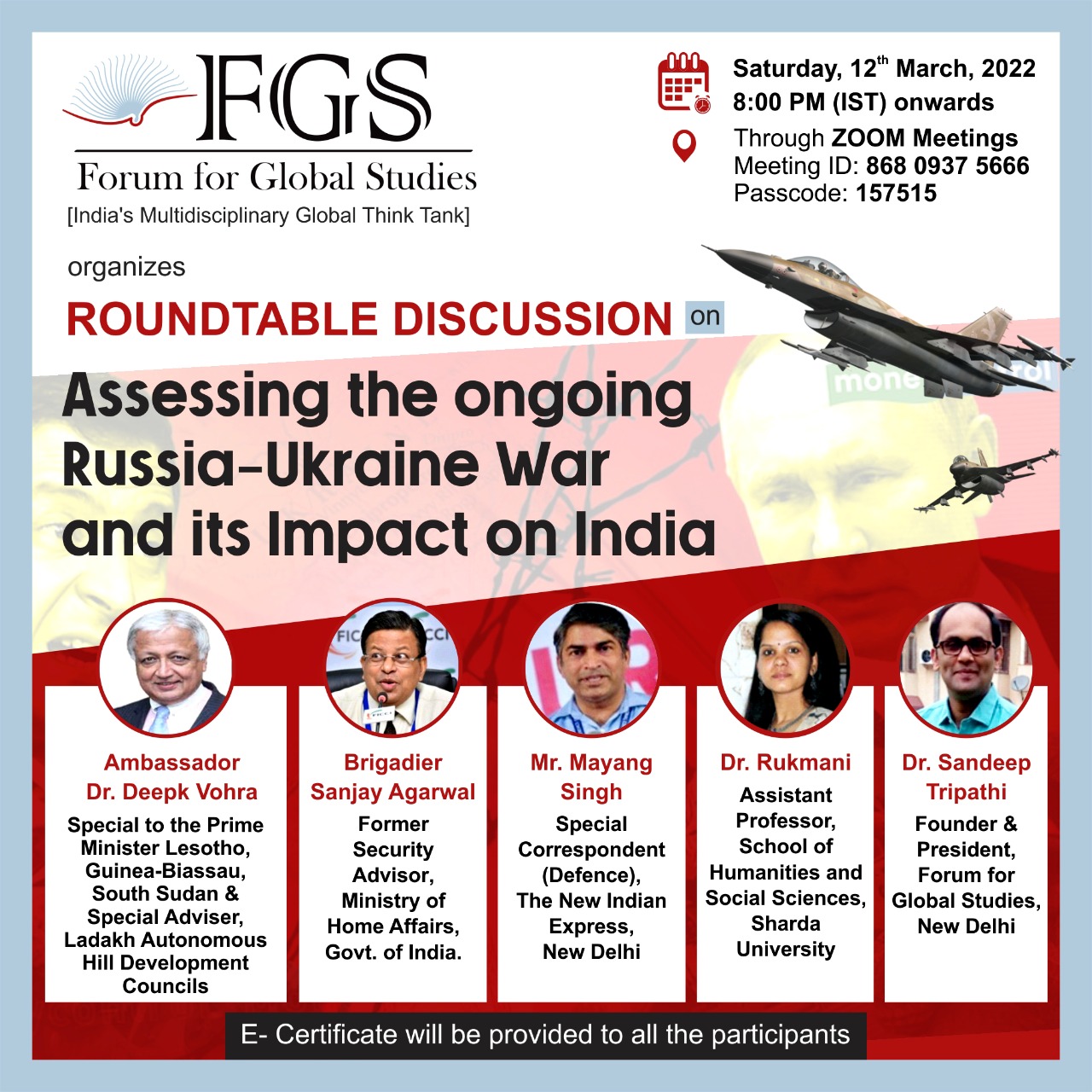On March 12, 2022, the Forum for Global Studies, New Delhi, a multidisciplinary global think tank, hosted a RoundTable Conference on the theme, “Assessing the ongoing Russia-Ukraine War and its Impact on India”. The discussion began with a welcoming speech by FGS founding President Dr. Sandeep Tripathi and Editorial review board member Dr. Rukmani Joshi. They welcomed the esteemed speakers, Ambassador Dr. Deepak Vohra, Brigadier Sanjay Agarwal, and Mr. Mayank Singh.
Dr. Deepak Vohra began the discussion by recalling President Ronald Reagan’s remark in his first meeting with Mikhail Gorbachev in 1985 that if a Martian Invasion (invasion by people from Mars) occurred, the Soviet Union and the United States would be forced to settle their differences overnight. He goes on to discuss the renowned American rap song “New World Order” and its punchline “Minds stay closed and mouth stays open,” and how it relates to the present situation in Ukraine and the leaders there. He then said what a journalist friend had told him: “Whenever the West gets engaged in other nations’ protest movements, it ends tragically for the protestors.” He also referenced the example of Hong Kong Pro-Democracy activists, who were supposed to be supported by the West but were bailed out while the protesters were jailed. “The world is a funny place, and truth is always the first casualty,” he stated. He then shed some insight on Russia’s and Ukraine historical backgrounds, reminding us of a 2009 study that found that 92 percent of Ukrainians opposed NATO membership and that Russia was their most dependable ally. He even referenced Vladimir Julianov as saying, “To lose Ukraine is to lose brain.” Making Russia and Ukraine completely understand one other.
Later in the conversation, he mentioned NATO’s obsession with Ukraine, despite the fact that past Ukrainian governments were hesitant to join any military alliance. However, in Dr. Vohra’s perspective, Ukraine’s current president, Zelensky, has a different outlook, and he is now waiting for the US to defend Ukraine, forgetting the reality that America will only come to the aid of its allies when it harms itself. Dr. Vohra then adds that Zelensky moved forward with the conflict based on a promise of help provided by governments thousands of miles distant, without thinking it through. He recited a few lyrics from a song on the situation in Ukraine, which goes, “Whatever I had dreamed of has not come true, I was sitting on a tree and it has burned.” He goes on to suggest that the West is terrified of a fully rearmed and combative Russia, as well as a rich, aggressive, and technologically advanced China that has come to Russia’s help. They have also requested that the North Atlantic Alliance cease its cold war methods, which the West is considering. He discusses the law of unintended consequences in relation to the current actions of the world, and he believes that once the crisis is resolved, international organizations will compete for funds to rebuild Ukraine, and then US-funded companies will get the contract, just as they did in Iraq and Afghanistan.
Later in the conversation, Brigadier Sanjay Agarwal discussed Ukraine’s geostrategic importance as well as the historical context of Russia and Ukraine. Dr. Rukmani then invited Mr. Mayank Singh to speak on the problem, and he discussed QUAD and India’s present need for technological advancement. But what is India’s priority, and what will determine India’s course of action. Furthermore, he addressed the West’s dwindling credibility, citing the example of leaving Afghanistan in a haste, and that India should not rely on such allies. However, India has a few strengths, such as amicable ties with most countries. Finally, as Dr. Deepak Vohra stated, “my enemy’s enemy is my friend, but my friend’s enemy is not necessarily my enemy.” They need India more than India needs them. It was an insightful and engaging discussion that not only highlighted India’s stance in the Ukraine-Russia conflict, but also enlightened attendees on Western policies, the history of Russia-Ukraine, and possible outcomes in the coming years.

